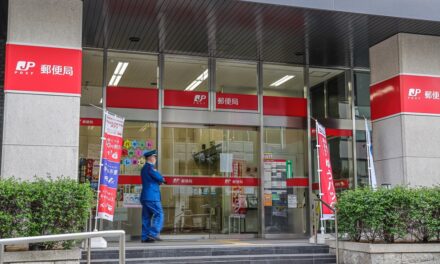
Panel agrees to split Japan Post into 4 entities in 2007
Prime Minister Junichiro Koizumi's policy-setting panel agreed Tuesday to divide state-backed Japan Post into four entities in April 2007, paving the way for the government to adopt a basic policy for Koizumi's postal privatization scheme.
The Council on Economic and Fiscal Policy agreed the four entities will operate under a holding company by inheriting postal services currently run by Japan Post — mail delivery, postal savings, "kampo" life insurance, and the management of the network of over-the-counter services at post offices.
Whether to split Japan Post into the entities at the start of the postal privatization process was the biggest issue in the ongoing debate on the future of Japan's postal services.
Economic and fiscal policy minister Heizo Takenaka, who has spearheaded postal reform along with Koizumi, has wanted Japan Post to be divided into four entities in 2007. Posts minister Taro Aso has pressed for the division to take place later and has proposed the launch of a special company covering all four businesses at the initial stage of privatization.
With that issue basically resolved, Koizumi will try to have a basic policy on postal privatization endorsed at a Cabinet meeting Friday.
After the panel meeting, Koizumi thanked panel members for their efforts to narrow their differences and called for further work so that the basic policy can be adopted at Friday's Cabinet meeting, Takenaka said.
Despite the latest agreement, Koizumi faces a rocky road as many lawmakers in his governing Liberal Democratic Party are firmly opposed to the privatization process and even the privatization scheme itself.
After the panel meeting, Koizumi vowed to work hard to realize his postal reform vision. Opposition within the LDP is likely to continue, but the government will eventually overcome it, Koizumi said.
On the ceiling of 10 million yen each depositor is allowed to save at post offices, panel members agreed to maintain the cap for the time being to prevent the postal savings business from squeezing similar operations in the private banking industry, the members said.
But the members agreed that such a cap should be abolished after postal services are placed fully under private management.
Earlier Tuesday, Japan Post President Masaharu Ikuta questioned the feasibility of splitting Japan Post into four entities in April 2007. Ikuta cited technical difficulties, saying it will take three years to establish a computer network.
To address this concern, the panel members agreed to set up an expert council at a governmental preparatory office for postal privatization and try to reach a conclusion by the end of this year, Takenaka said.
As for whether three companies handling postal savings, life insurance and the management of the network of over-the-counter services at post offices should be divided by region, the panel members agreed that the issue will be decided by the managers of the new companies, Takenaka said.
The basic postal reform policy is based on an initial plan Takenaka drew up Aug. 6, which was presented to the government panel last Tuesday.
The policy stipulates the government will privatize the public postal corporation in stages beginning in April 2007 and complete the process by 2017.
During Tuesday's meeting, the panel endorsed a plan to place two companies handling postal savings and insurance under full private management during the 10-year transitional period for privatization through 2017 by selling stakes the government holds, Takenaka said.
Takenaka's initial proposal says a public liquidation corporation should be set up to take over contracts of postal savings and "kampo" life insurance policies made prior to the start of privatization in April 2007.
The proposal also stipulates the launch of a government task force involving all Cabinet members to promote the privatization process.
Japan Post took over the government's postal services in April last year.
Plan to split Japan's post office backed MARKET-LED REFORMS:
Financial Times UK, London Ed3, p 9 09-08-2004
By By DAVID PILLING
Junichiro Koizumi, Japan's prime minister, yesterday persuaded an important cabinet body to adopt a pro-competitive position on the privatisation of the country's giant post office, the cornerstone of market-led reforms he has pursued for 20 years.
The Council on Economic and Fiscal Policy approved a plan to split the post office into four separate units from the outset of privatisation in 2007.
The idea, seen by many as essential to ensuring a level playing field between the post office and rival providers of financial services, must be ratified by Mr Koizumi's own Liberal Democratic party (LDP) and by the full cabinet on Friday.
Mr Koizumi said he was convinced it was necessary to divide the post office into four discrete divisions – covering mail delivery, postal savings, life assurance and a new counter services unit – from 2007.
"I am hoping that the post office will be split into four units from the very first day of the privatisation," he said.
Opponents of the idea, including Masaharu Ikuta, president of Japan Post, have said it would be impossible to separate the units so quickly, partly for technical reasons.
They are calling instead for a phased transition in the 10 years to 2017, over which time the post office is due to be fully privatised.
Commercial banks and insurance companies say they fear a unified post office, which has 24,000 branches nationwide, will be able to cross-subsidise business divisions. That would give it an unfair advantage, creating a "monster", they say. As part of the privatisation, the post office will be allowed to enter new businesses, such as offering commercial loans and a much wider array of insurance products.
Privatisation of the post office, the world's biggest financial institution with Dollars 3,600bn (Euros 2,980bn, Pounds 2,030bn) in total savings and insurance assets, is extremely controversial within the LDP.
The post office employs 280,000 staff, one in three public servants, and has been skilfully used by the party to recycle the nation's enormous savings into favoured public works.
Naoki Tanaka, president of the 21st Century Public Policy Institute and an adviser to the prime minister on the privatisation, said it was vital that the post office be split into separate profit centres.
It should also be stripped of other privileges, such as its non-tax-paying status and its regulation by the ministry of public management rather than the Financial Services Agency, he said.
Many of those details have still to be hammered out.
Mr Tanaka said the prime minister would use his political clout to ensure the creation of a level playing field.
"Mr Koizumi will guide this process, though before the end there will be a lot of political discussion," Mr Tanaka said.
Some compromises might have to be made, he conceded.
"For three or four years (after privatisation), some kind of tax exemption or reduction of tax might be left", Mr Tanaka said.
"But this will only be for a short time and basically, from 2007, the post office will be on an equal footing."
One member of a committee that advised the prime minister on privatisation, speaking on condition of anonymity, said Mr Koizumi's plan was unlikely to survive the political process intact.
"I am worried that the concept of 'equal footing' will be very difficult to achieve," he said.












